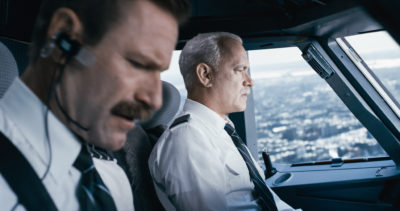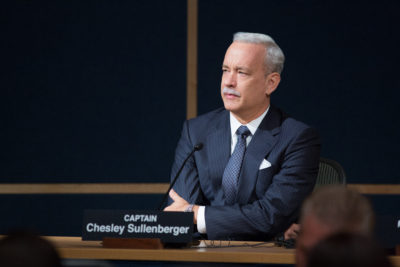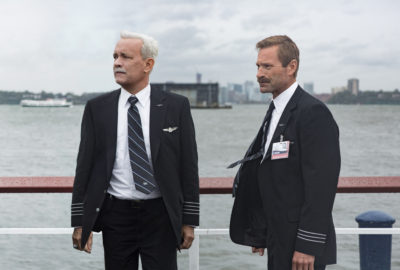
Tom Hanks has another Oscar®-worthy role in another very entertaining movie.
Clint Eastwood’s Sully tells the story we never knew about – the NTSB investigation into whether Captain Chesley ‘Sully’ Sullenberg made the right/only choice when he landed Castle 1549 in the Hudson River in January of 2009. All 155 souls aboard survived, but the investigators claimed he didn’t have to land there.
Sully opens with the forced water landing of Castle 1549 then moves into intriguing territory.
Thanks to the NTSB investigation – and computer simulations that suggested Sully (Tom Hanks) had ample time to reach at least two nearby landing strips, as well as engineering reports that one engine still had thrust – Sully is plagued by thoughts of how these alternate tacks would have played out based on his personal experience of the situation. None of them are pretty, but even when second-guessing his decision Sully knows in his heart he took the only option available to him.
The panel heading the investigation – Charles Porter (Mike O’Malley, Justified, Glee), Elizabeth (Anna Gunn, Breaking Bad) and Ben Edwards (Jamey Sheridan, Homeland, Arrow) – are confident about their simulations, though Porter seems far too determined to prove Sully wrong while the others seem uncomfortable with his actions. I guess every film needs a villain…

On the sidelines – well, at home on phone, Sully’s wife, Lorraine (Laura Linney, The Big C, Mr. Holmes) can do little more than offer support and worry. Linney takes what could have been a one-note role and infuses it with a deeper humanity. Lorraine is Sully’s anchor, providing firm belief in his choices.
The most dramatic moments in Sully are when Sully and co-pilot Jeff Skiles (Aaron Eckhart, Thank You For Smoking, Olympus Has Fallen) face the danger caused when a flock of geese shut down both engines and they have to make that forced water landing, and when Sully, who has come back from his self-doubt thanks to an epiphany in a bar, makes his case in the public hearing (he makes a point, asks a question and requests an adjustment – simple stuff, but crucial).
Eastwood, working from a script by Todd Komarnicki (based on the book Highest Duty by Sullenberg and Jeffrey Zaslow), has created a film of simple elegance. There are no overly fussy shots; no great action sequences of the kind we usually see, and his pacing is even more deliberate than usual – yet he tells his story in a brief 95 minutes (by far his shortest film).
What Eastwood gets is the turmoil of the characters from Sully right down to the three last minute passengers whose original flight was canceled – and barely make this flight.
The cast of passengers includes any number of character actors you will sort of recognize (he’s that guy from that film; I’ve seen her on something on TV); actors who can make even roles without lines as real as the person sitting next to you in the theater.

Unusually, the score isn’t by Eastwood (though a main theme is credited to him), it’s by Christian Jacob and it is as nuanced and unobtrusive a score as you could ask for. It supplements the story and emotional beats rather than calling attention to them.
There are moments to quibble over course – the timing of a report dealing with evidence from an engine that broke off and fell into river, for example – but they are few and far between (the one I mentioned is the only really obvious one).
Hanks completely captures Sully’s confidence in his abilities; his moments of self-doubt and the moment when his epiphany allows him to regain his mojo. It’s the kind of performance that can earn an actor an Oscar® nomination, but may not be showy enough for him to actually win.
Both Linney and Eckhart are brilliant in support and the rest of the cast – from Chris Bauer (union rep Larry Rooney) to Valerie Mahaffey (passenger Diane Higgins), from Ann Cusack (flight attendant Donna Dent) to Christopher Curry (late passenger, Rob Kolodjay) – all contribute weight and reality to the film.
Overall, Sully is a really good, solid film that deals with people as they really are; suggests that computers are only as smart (or dumb) as we make them, and reinforces the idea that a film doesn’t have to have car chases and explosions to be entertaining.
Final Grade: A
Photos by Keith Bernstein/Courtesy of Warner Bros. Pictures